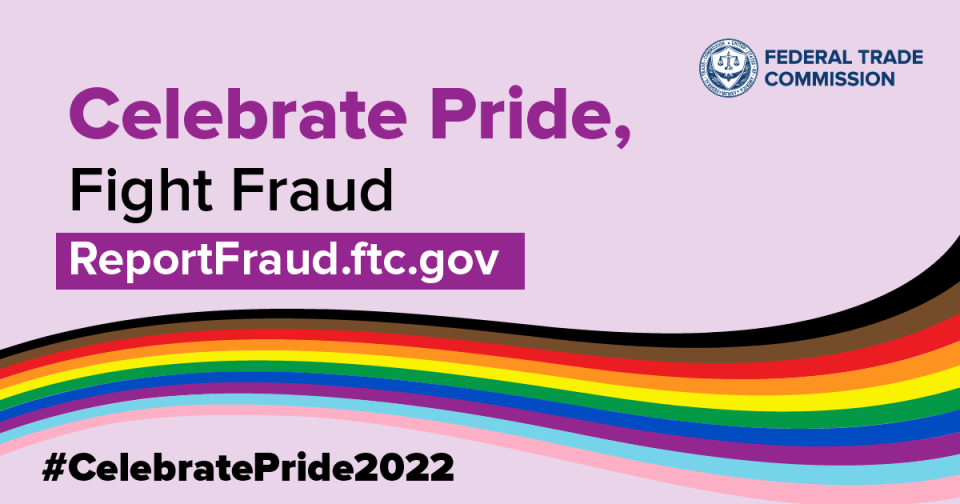Fraud affects every community, and some of the most egregious scams and abuses target the LGBTQ+ community. This Pride Month, the FTC wants to help the community fight back.
LGBTQ+ consumers face a unique set of challenges. Many of the same tools we use to connect and build community can also be weaponized by scammers and their enablers.
For example, scammers can prey on us through dating apps, and threaten to shame us to family and friends if we don’t pay up. And geolocation-based apps that help us connect with our neighbors can also be weaponized by scammers, who can use the valuable data on our whereabouts to threaten us with harm. Corporations that roll out the Pride Flag every June may be facilitating these frauds by enabling romance scammers to use their platforms to harm people or selling our personal information to the highest bidders.
Thankfully, the LGBTQ+ community is uniquely suited to fight back. One of the biggest impediments to stopping fraud is shame — many of us are embarrassed to admit that we’ve been scammed, so we don’t report the fraud to law enforcement or tell our communities about how to avoid it. To those of us in the LGBTQ+ community, this may feel familiar — we know how shame can hold us back and prevent us from demanding justice. But one of the great achievements of the LGBTQ+ community has been our ability to overcome that shame, and to work together to fight back against bigotry and hate. In fact, that’s the whole point of Pride Month — to take pride in who we are, rather than feel ashamed.
This Pride Month, the FTC hopes that LGBTQ+ consumers can take pride in fighting back against fraud and other abuses. This month, we’ll discuss some consumer protection issues that affect the LGBTQ+ community — including how to fight back against cryptocurrency schemes, and romance scams, and about your rights when it comes to credit discrimination. Unfortunately, we often see cryptocurrency and romance scams rolled together — and you’ll learn about that, too.
We hope you’ll share FTC resources, as well as these blogs and graphics, with your friends and family, on social media, and far and wide within the LGBTQ+ community.
Most importantly, we hope that when you spot a scam, you’ll tell a friend or loved one. Believe it or not, that one act helps you protect yourself from the scam — and it helps your loved one know how to avoid that scam, too.
Then, we hope you’ll tell the FTC at ReportFraud.ftc.gov. Because every report helps us and our law enforcement partners go after companies committing fraud, scams, and bad business practices that hurt the LGBTQ+ community.
Stayed tuned for more Pride posts this month. To make sure you don’t miss anything, sign up at ftc.gov/ConsumerAlerts.


It is your choice whether to submit a comment. If you do, you must create a user name, or we will not post your comment. The Federal Trade Commission Act authorizes this information collection for purposes of managing online comments. Comments and user names are part of the Federal Trade Commission’s (FTC) public records system, and user names also are part of the FTC’s computer user records system. We may routinely use these records as described in the FTC’s Privacy Act system notices. For more information on how the FTC handles information that we collect, please read our privacy policy.
The purpose of this blog and its comments section is to inform readers about Federal Trade Commission activity, and share information to help them avoid, report, and recover from fraud, scams, and bad business practices. Your thoughts, ideas, and concerns are welcome, and we encourage comments. But keep in mind, this is a moderated blog. We review all comments before they are posted, and we won’t post comments that don’t comply with our commenting policy. We expect commenters to treat each other and the blog writers with respect.
We don't edit comments to remove objectionable content, so please ensure that your comment contains none of the above. The comments posted on this blog become part of the public domain. To protect your privacy and the privacy of other people, please do not include personal information. Opinions in comments that appear in this blog belong to the individuals who expressed them. They do not belong to or represent views of the Federal Trade Commission.
It may be that you give advice. I am in Canada. I was scammed for over $1,000,000,00 The police couldn't do anything to help me cause the scammer was out of the country using Mules. One Mule was in Ontario. I reported to police. Eventually went to court. The mule had legal protection.
Said Monday came from business deal . Not from my bank Wire. I lost that money. Just because I gave that money scammer, the policeman involved in court cas, said I am the perpetrator because I willingly wire the money to the scammer. I thought I wired the money for a business deal.
The legal system is broken. It failed me. I lost everything. I am living in poverty in broken down trailer.
Before Internet was invented there would not be any scams. Old way of communicating & sending by cheque through Postal Mail Service was safer. Thank you for reading this.
Is there any advice you can give to recover some of my money would be appreciated.
No authority could have predicted that internet would cause so much cyber robberies.
Just to let know my user name. I was scammed over $1,400,000.00.
The police cannot help me, instead of tracing the money, they tried to trace the scammer. Of course he didn't exist or he removed every detail of this himself from the internet.
The banks don't help either.
I am living in poverty in a broken-down trailer. Soon I will be on the streets.
Your website is only to warn people but you cannot help.